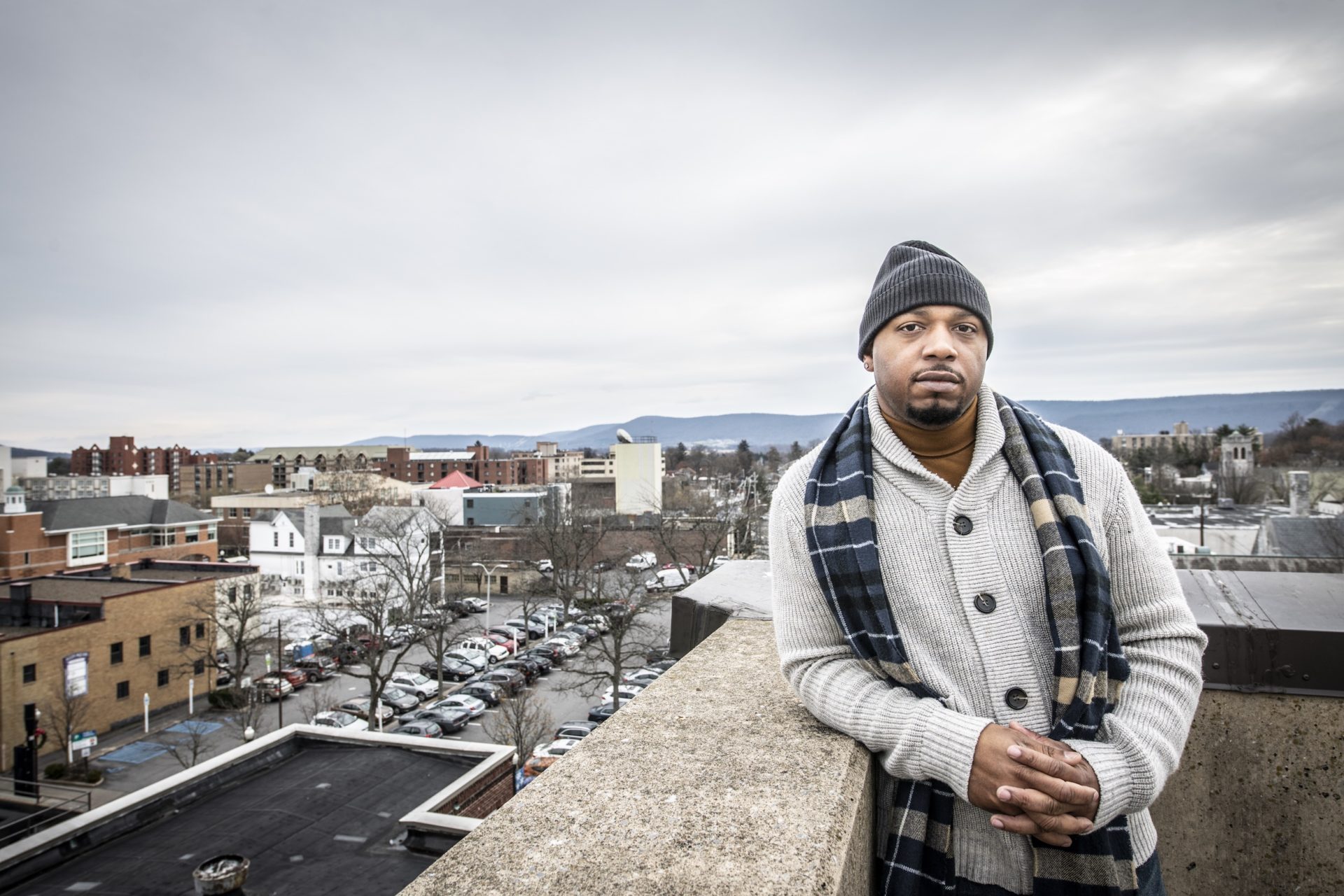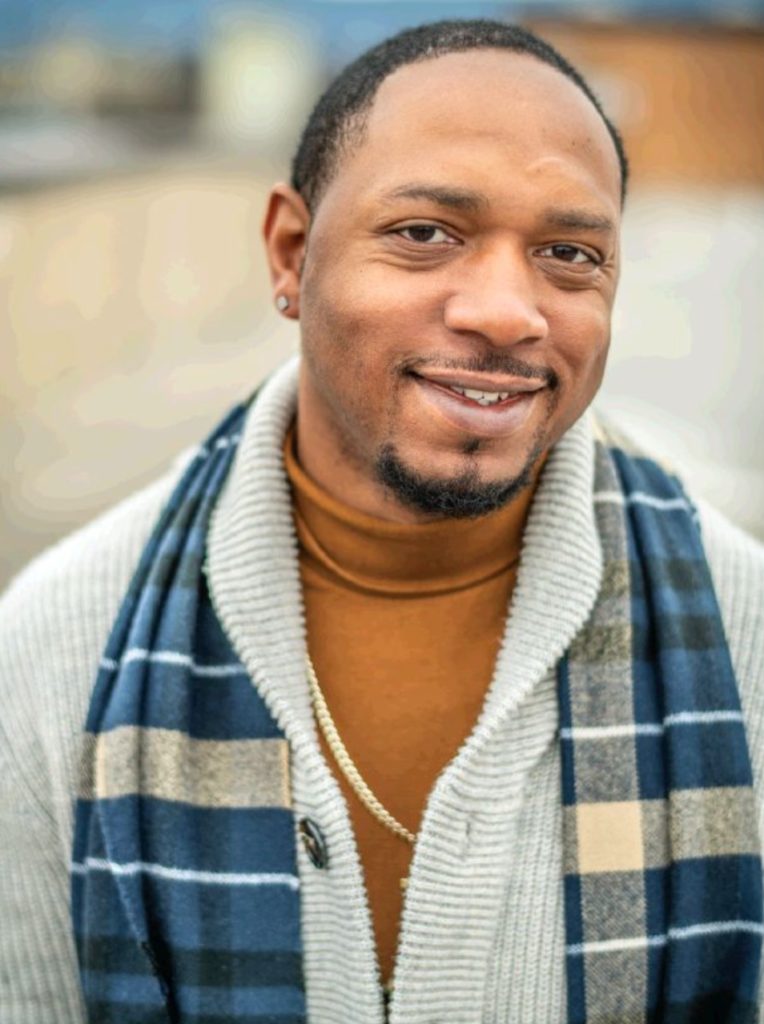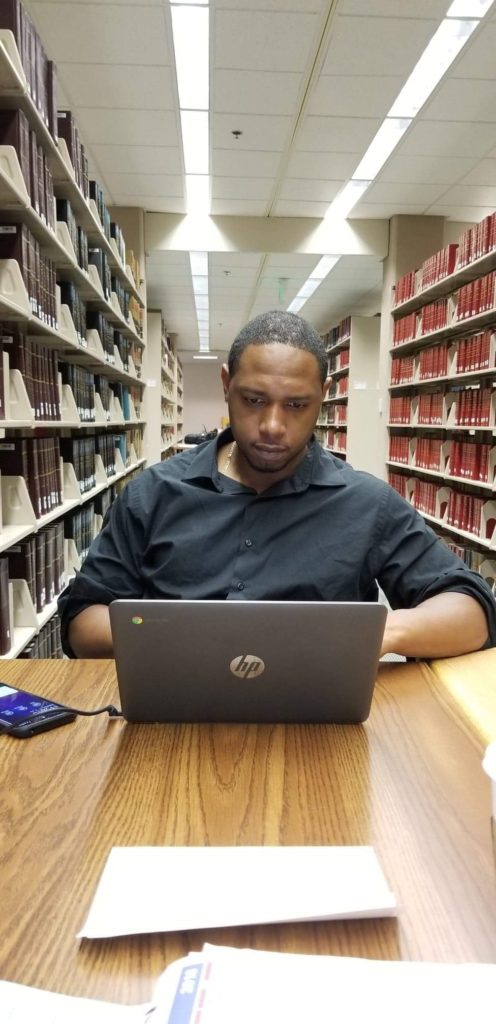
“I am not going to make the decisions for the town; I am going to make decisions with the town,” Lipscomb says. (Photo by Darren Andrew Weimert)

“I am not going to make the decisions for the town; I am going to make decisions with the town,” Lipscomb says. (Photo by Darren Andrew Weimert)
Standing in front of the Allen Street Gates before a crowd of community members in June 2020, Divine Lipscomb made a statement that changed the course of his life.
The people were gathered for a Justice for Black Lives protest, which was part of a nationwide movement against police brutality and racial injustice. Lipscomb was reading the demands of the 3/20 Coalition surrounding the tragic death of Osaze Osagie, who was fatally shot by State College police who had come to his apartment to serve a mental health warrant.
“I said, ‘If you don’t want to meet our demands, I’ll just run for your seat,” remembers Lipscomb. Afterward, a politically minded person asked him if he was serious.
“I was when I said it,” Lipscomb says, looking back now. But then he adds with a knowing grin: “But I really wasn’t.”
What he was serious about was working to make sure that something like the Osagie shooting would never happen again in this community. He wanted his kids to feel safe growing up in this town he calls home. He wanted to be heard. Borough Council eventually ended up meeting nine of the coalition’s 10 demands, but the ball was already rolling for Lipscomb.
Teamed with progressive candidates Gopal Balachandran and Richard Biever, Lipscomb and his ticket swept through the primary and general elections. They take office this month. Lipscomb, 39, has overcome more difficult circumstances than most can imagine to become the first African American man and formerly incarcerated individual ever elected to State College’s Borough Council.
It seems that this is just the next big step in an extraordinary life.
This was not exactly the plan. Lipscomb is working toward his undergraduate degree, and is set to graduate this spring. Next up was to be law or graduate school. Then, he had hoped to enter politics.
But, as Lipscomb can attest, life doesn’t always go according to plan. One thing is for sure: Don’t put barriers in front of Divine Lipscomb, because he continues to break through them, and he wants to help others do the same.
Checking the box
Even after everything he has accomplished – starting his own business and nonprofit, being elected to Borough Council, winning multiple awards as a Penn State student – Lipscomb still has to check that “yes” box every time he fills out a job or school application: “Have you ever been convicted of a felony?”
When he was a teenager, he was twice convicted for armed robbery. He was incarcerated, spending time in juvenile detention, drug treatment programs, and four straight years in state prison. He has to relive it every time he checks that box.
“I just had to do it again, because at Penn State every five years you have to go through your clearances, and it does not feel good,” he says. “I feel exposed, like vulnerable. But one thing I have never done is shy away from it, because I fear you firing me because I didn’t answer that question.”
But still, he doesn’t really want to talk about it.
“I don’t want to talk about what I did 18 years ago. That may or may not prevent you from allowing me access. It’s a barrier. I don’t like that it is something for you to use against me, right? An additional strike. So, it’s a deterrent for most folks for a lot of people to have to check that box. But for me, it’s also a challenge.”
Because of that barrier, Lipscomb has started a nonprofit, The Corrective Gentleman, to help other incarcerated or returned citizens make it on the outside. He knows how hard that is. He knows because he has lived it.
A lifetime of trauma
It hard to believe that this calm, thoughtful, intelligent, articulate man who seems to be instantly likeable was once so full of anger that he committed armed robbery. But not really, not if you try to understand that his anger had stemmed from a multitude of traumatic events that he endured while growing up.
“Before I even used a drug or started running the streets, I was dealing with sexual trauma. I didn’t know what it was. I thought it was OK. It happened more than once before the age of 10, and I didn’t tell anyone. I didn’t speak about it,” says Lipscomb.
Because it was women who sexually assaulted him, he was not able to fully understand how it impacted him until much later in life.
“It happens to so many boys who don’t speak about it. Research shows that unless there is penetration, boys don’t even consider it rape. I didn’t label it sexual assault until I was in my 30s,” says Lipscomb.
Then, as he was still dealing with this trauma, his life was flipped upside down. His older brother left and a new step-dad brought violence into his home.
“Then my real father came into my life and then we moved. So much was happening in that small moment,” says Lipscomb. “Before all of the violence started in my household, before any of that, I was trying to process that (sexual abuse). So, it was easy to fall into alcohol and drugs when I put my hand onto it. And that made it easier further down the line, when I was 14, to join gangs.”
At that time in New York, gangs were becoming more rampant and for him it filled a void in his life.
“The notion around most gangs is not typically getting money, or I am going to have the biggest car, sell all these drugs. That is not the purpose of most gangs. It’s about family, brotherhood, sisterhood, and that is what I was sold on,” says Lipscomb.
Juvenile detention, prison, solitary confinement just added more trauma to a man who was still dealing with something that happened to him when he was too young to understand. Released from prison at the age of 20, he was nowhere near rehabilitated, but eventually he did find a way out.

Divine intervention
Someone who is always looking to fight against injustice, Lipscomb felt that as part of a gang, “we were going to fight this oppression. Whether it is from the police, whether it is from other opposing gangs, we were going to make sure that our communities are safe. Then at some point I realized I was the oppressor.”
It was after he was sent to a treatment facility when he was caught for a DUI while on parole that he got a phone call that helped bring him to this revelation.
“I found out over the phone that I was having a boy. I didn’t want boys; I didn’t want a younger version of me,” he says. “I didn’t want my son to experience anything that I ever experienced, particularly in the carceral system. So, when I found out that I was having a boy, the first thing I knew, I had to put my flag down, and so I did.”
Around the same time, he heard a reformed former gang member speak.
“He was from a different gang, older gentleman. He shared my story, like literally. He said he was happy; he was clean and he was no longer gang-affiliated. I didn’t understand how he was able to do that. I wanted that,” says Lipscomb.
He worked to turn his life around, trying to stay sober. He went to school, earning an associate’s degree in business. Still, it wasn’t easy. Shortly after, he began to relapse, and he split up with his now ex-wife. He was in the middle of making a very bad decision when the sister of one of the friends he made in prison called.
Lipscomb’s friend was killed in 2005, but the friend’s sister, Teree, continued to call and check in on Divine, to make sure he wasn’t making any poor decisions.
“I was definitely drinking a lot, because I was in that space of losing everything again and having to start over. It was just one of many dark times. She said that I needed to leave the town, needed to leave New York, and that she was going to come get me, and I was like, ‘whatever.’ She showed up a week later and came and got me,” he says.
Teree brought him to her home in State College. Eventually, they married. They built a home and life together (Lipscomb has six children: two with his former wife, and four stepchildren with Teree) in the town he now calls his “safe haven.”

‘Kept hitting that button’
When he moved here, Lipscomb had only ever heard of Penn State in a Notorious B.I.G. song.
Going from the streets of New York to the mountains of central Pennsylvania was “a huge culture shock,” not without its difficulties; but eventually, it became home. Lipscomb still remembers getting his first job at the Autoport, eventually becoming a manger. With the support of his wife, he started his own T-shirt business, B Divine 82.
Eventually he felt the pull of Penn State. He knew that he had more to offer and if he really wanted to make an impact through his Corrective Gentleman program, he was going to have to take that next step.
“I kept seeing students come in and out through the doors of the Autoport, getting their degrees. I had an associate’s degree. I knew I was smart. … I needed to go back to school, I needed to move my program forward,” says Lipscomb.
As it always has for him, persistence paid off when it came to Penn State, both as an employee and a student.
For eight years, he applied to work at Penn State in the Nittany Lion Inn, every time checking that box, before finally he was hired.
“Every year I would hit that button and it worked. And the same with school. I would keep putting my application in and whatever barrier was there, it might have taken me a year, but I always go back,” he says.
After finally getting accepted, Lipscomb has excelled as a student in the Rehabilitation and Human Services program, winning the 2020 Outstanding Adult Student Award and the Rock Ethics Institute’s 2020 Stand Up Award.
Through it all, he continues to process his traumas in therapy. He continues in recovery, healing from the past. He has learned to control his temper and use his words to express when he is upset.
“One of the things as a manifestation of prison is I currently have anxiety disorder, major depressive disorder, and PTSD. Going through all that trauma, sexual assault, violent abuses in the household, and then solitary confinement … I was a child. And 18 years later, it’s still manifests,” he says.
Lipscomb hopes to use his degree to build his nonprofit into a place, “where formerly and currently incarcerated people can tap in to find resources, whether they want to go back to school, if they want to tap into entrepreneurship, training, definitely counseling, because counseling for me now is a huge component in my life.”

‘We live here together’
Lipscomb was called to action with the 3/20 Coalition in part because of his past and in part because of his children’s future. He fears it could be him whose death is considered justified in the eyes of the law because he has a criminal past. It could be his son, out making TikTok dance videos in a place where he is considered an outsider, who is put in a tragic situation.
“So how do we change that? And we can, we can march, we can do all those things. We can argue about CRT, but if we’re not in the same damn spaces together, sharing our experiences together, none of that means anything,” he says.
As a council member, Lipscomb hopes he can use his experiences to help foster those conversations, just as he did on the campaign trail.
“I am not going to make the decisions for the town, I am going to make decisions with the town,” says Lipscomb. “I ran on the promise that I’m going to communicate with my neighbors and want to learn my neighbors. Because we are neighbors. We live here together. The problem with politics is that people believe they have power and they assume this power and they believe that they know what’s best for everyone.”
Lipscomb knows he can’t make everyone happy, but he says, “I need everyone’s input before I can make a decision. I don’t think it’s a lack of self-confidence, but I don’t ever think I have the right answer. Because when I thought I had the right answers, I was always wrong.”
He understands that State College is a “bubble,” without much crime and with a high standard of living. It is part of what drew him to the area. He hopes to make that high standard more accessible to all in the community, and maybe be an example for the rest of the country.“What we can do in our world is create a model of what we want the rest of our world to look like. Because one thing that the old council said that was correct is that this is the ideal place to live,” he says. “There’s not a lot of crime; we don’t want to dismantle the system. We want the system to work better and equitably for everyone. And State College has the ability to do that. We have the resources, we have the space, we have the minds to do that, to figure that out. What we need to have, though, is the willingness to come together and have these conversations and figure that out.”
Vincent Corso is a staff writer for Town&Gown and The Centre County Gazette. This story appears in the January 2021 issue of Town&Gown.
Receive all the latest news and events right to your inbox.

80% of consumers turn to directories with reviews to find a local business.